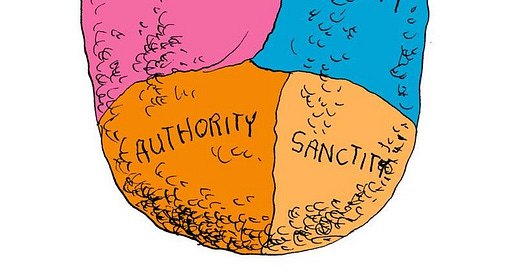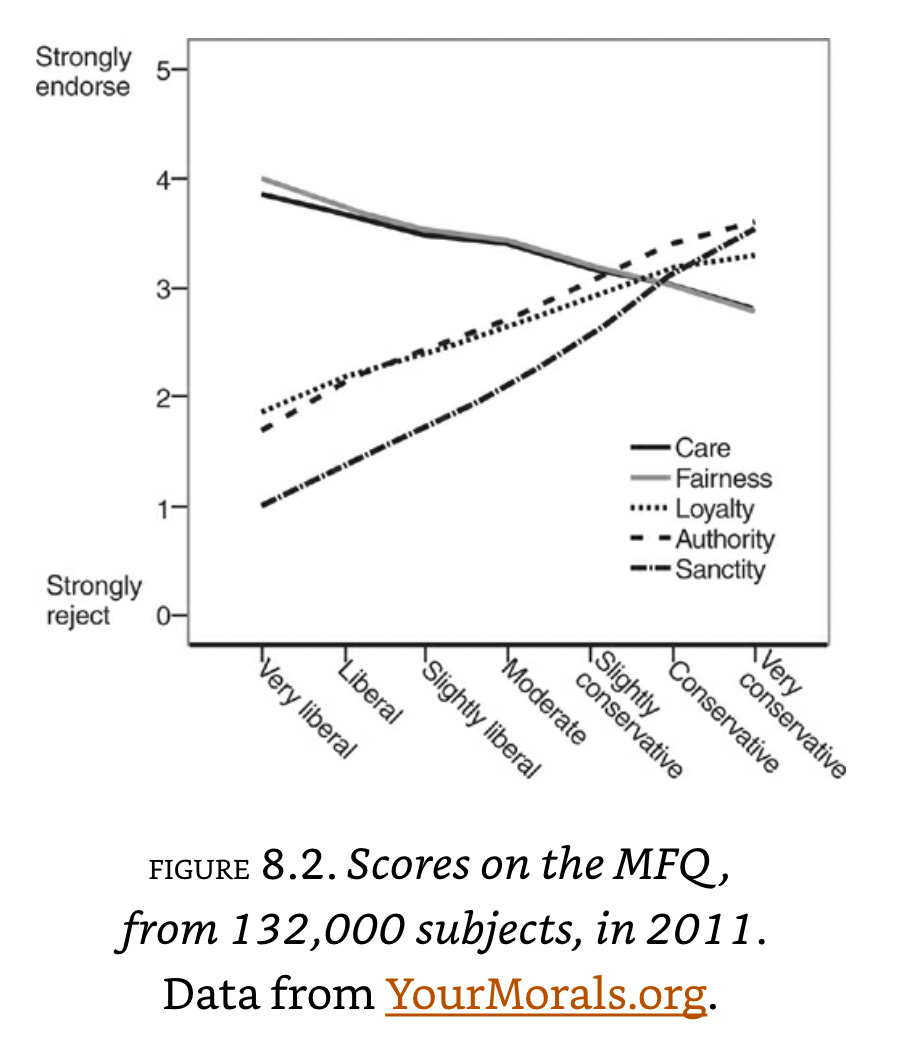Last week, I wrote about how Jonathan Haidt argues that there is more to morality than harm and fairness, and how we might categorize moral thinking into three broad ethics that societies build around:
Ethic of Autonomy
Ethic of Community
Ethic of Divinity
Still though, Haidt believed that there is more nuance to the moral mind than these three broad ethics can define. In observing different societies and cultures around the world—and their unique ways of dealing with moral quandaries—Haidt developed a theory of morality around five foundations or “taste receptors.”
“Just like we all have the same five taste receptors but prefer different foods, we all have these same five moral foundations, but in different proportions.”
These foundations are:
Care/Harm
Fairness/Cheating
Loyalty/Betrayal
Authority/Subversion
Sanctity/Degradation
Moral Taste Receptors and Politics
What’s particularly interesting about these taste receptors, in my opinion, is how they play out in modern American political discourse. Let’s take a closer look at each foundation and examine how they are used between conservatives and liberals.
Carm/Harm foundation prioritizes empathy and compassion for others in making moral choices. Both conservatives and liberals rely on the Care/Harm foundation but in slightly different ways according to Haidt. For example, liberal talking points often center around “saving the planet” or “save Darfur” or other causes while conservative talking points often prioritize “Wounded Warriors” and caring for people who have sacrificed a lot for this country.
Fairness/cheating foundation prioritizes justice and cooperation. Both liberals and conservatives care about fairness/cheating but in different ways. For example, liberals often believe that rich people should be taxed more so that they pay their “fair share” while conservatives argue that liberals want to take money from hardworking people and give it to lazy people. For liberals, fairness is about equality while for conservatives fairness is about proportionality.
Loyalty/betrayal foundation emphasizes patriotism and self-sacrifice. Conservatives appeal to the loyalty foundation with “America first” foreign policy and broad support for American exceptionalism.
Authority/subversion foundation prioritizes tradition and leadership. Conservatives appeal to this foundation with broad support for the police and a hierarchical structure to society.
Sanctity/degradation foundation emphasizes the value of purity and sanctity. This foundation is the reason why many people believe that humans are not mere animals but actually house an immortal soul that requires more sacred respect. Conservatives rely on this foundation when talking about the sanctity of life or marriage.
The diverse palette of conservative American politics
You’ll notice above that I did not explain the liberal use of the loyalty/betrayal, authority/subversion, or sanctity/degradation foundation. This is because Jonathan Haidt and others—through decades of research and dozens of studies—have found a striking relationship between the diversity of one’s moral taste receptors and one’s political affiliation.
Study after study has found that liberals rely almost exclusively on the care/harm and fairness/cheating foundation while conservative rely on all five.
Date from over 132,000 participants on a website called YourMorals.org has found that the more conservative you are, the more you endorse all five moral taste receptors.
As you can see, conservatives still strongly endorse the care/harm and fairness/cheating foundation, but hold each of the other foundations in the same high regard. This realization was eye-opening to me as I sought to understand why the gap between liberals and conservatives seems so wide. It turns out that this gap is exactly three moral foundations wide.
These data continue to explain various patterns I notice in the world. For example, these data may explain why young, non-religious people are often liberal. Young people don’t feel as loyal to their country because they haven’t been around long enough or felt that their country has done anything for them. Young people often enjoy defying authority and going against the status quo. Non-religious people also likely don’t value the sanctity foundation as heavily.
Of course, this is all just one theory based largely on one man’s body of work. But I’m curious, do you all agree? If you were to make a list of all of the moral opinions you feel strongly about, do they each fit nicely into one of these buckets? Whether you are conservative or liberal, do you fall along the same lines as the 132,000 subjects in Haidt’s research?
This is a theory that I feel hasn’t gone mainstream yet and I’m curious to know what new-comers think, so let me know in the comments!
⚡️P.S. If you're new here and want to read more of the Synapse Newsletter each Sunday, subscribe below!⚡️
📚 P.S.S. I having forgotten about our Free Will book discussion that I announced here. I am working through the book now (it is admittedly more dense than I thought it would be) and will have more info on this in the coming weeks.






Ha ha ha. The issue is NOT that one of the two groups isn't holding all five "moral foundations" in roughly about the same regard! As if that would indicate some pleasing "nuance."
Rather what is important to note is that one of the two groups focuses on the foundations that are the important ones, while the other group is confused and muddled and stuck in thinking that less important foundations are actually important. ;-)
I first came across this research about 5 years ago and found it really helpful. Interestingly I think it's shifting. Looking at Liberal vs. Conservative it holds fairly true, but the Woke left, it seems to me, have taken on the other matrices to a certain extent. For instance, authority has become important in the sense that a person's intersectional identity grants them moral authority and expert status, and subverting that person's authority is considered bigotry. And sanctity shows up in the necessity to purify your views and communities - any idea that is counter to the ideology is a 'virus' that must be wiped out, and anyone whose ideas diverge from yours (even if you're in 99% agreement) must be re-educated or cancelled to maintain the purity of the community.